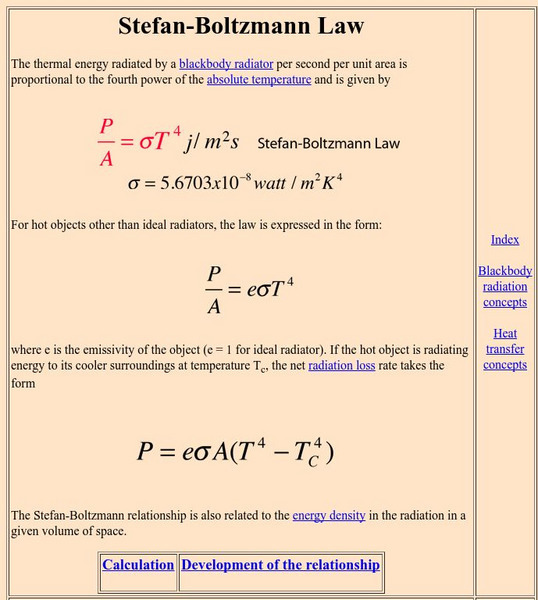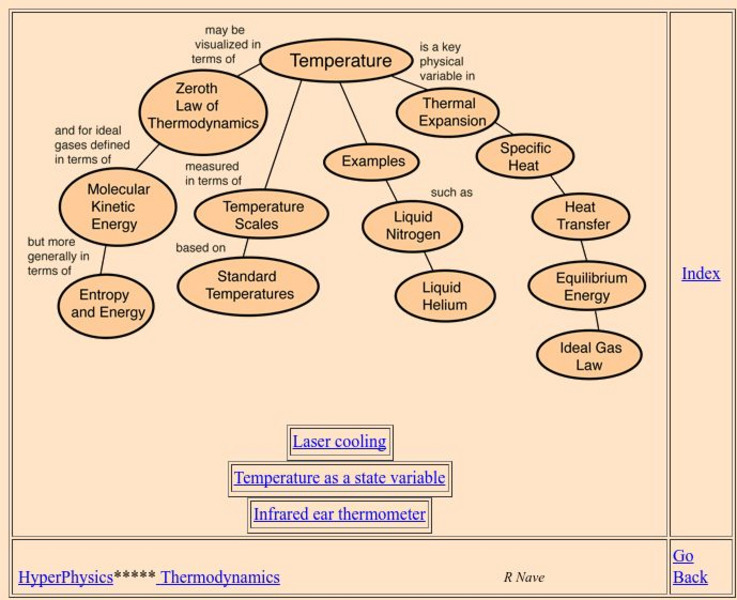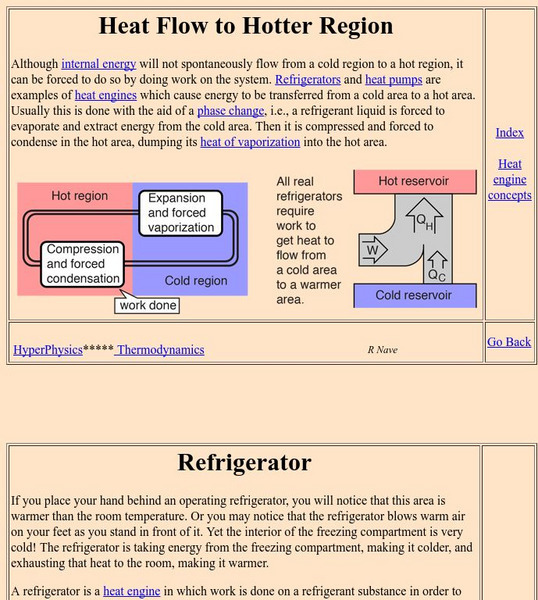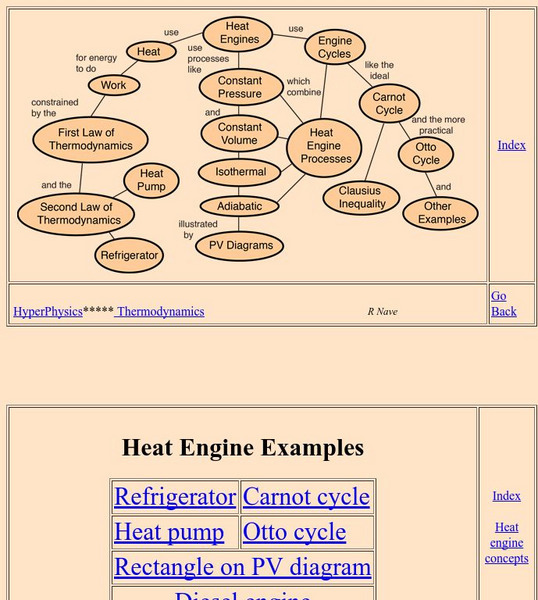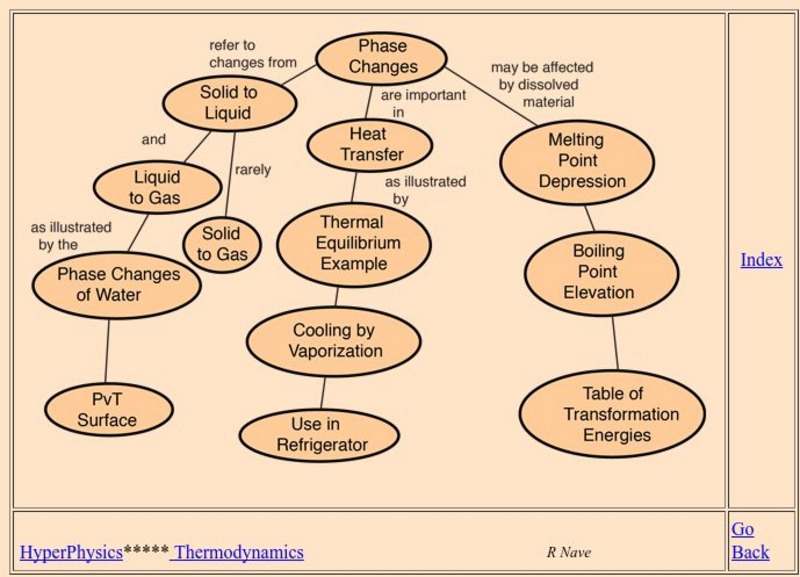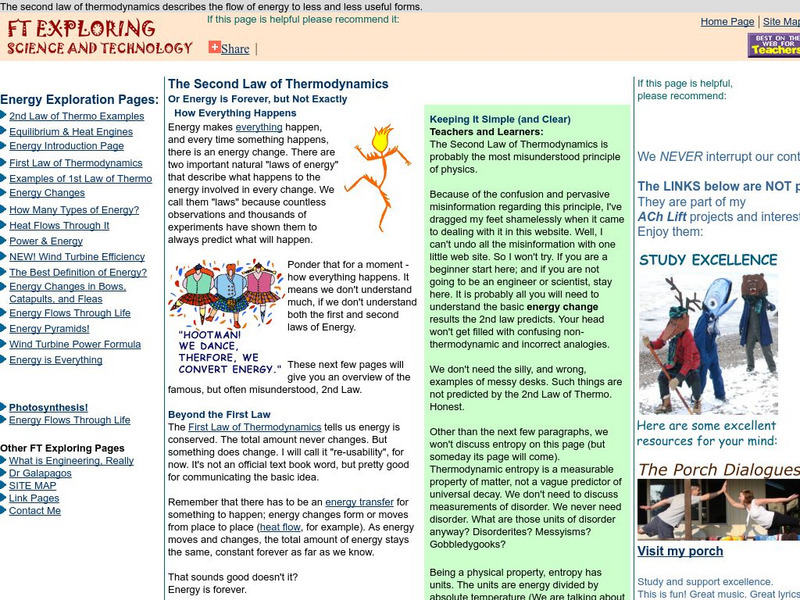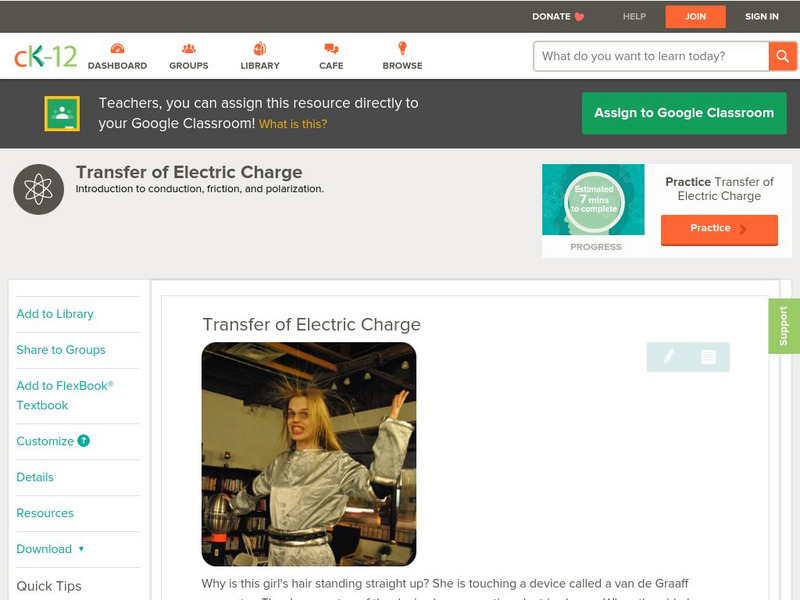University of Sydney (Australia)
Thermal Physics Module: Thermal Expansion [Pdf]
A lengthy set of lecture notes on the topics of thermal expansion and heat absorption. The concept of specific heat capacity is explained and numerical examples are discussed. Heats of transformation (fusion, vaporization) are explained...
Georgia State University
Georgia State University: Hyper Physics: Zeroth Law of Thermodynamics
The principle of thermal equilibrium is discussed and explained. The zeroth law of thermodynamics is stated. Links to several other pages with related information are provided.
Georgia State University
Georgia State University: Hyper Physics: Heat Radiation
The process of energy transfer by radiation is discussed. An equation for calculating the rate of radiative energy transfer is provided. Variables in the equation are explained. An interactive form allows for problem-solving practice...
Georgia State University
Georgia State University: Hyper Physics: Radiation Cooling of Body
Discusses the means by which the body regulates its temperature. The role of radiation in this process is explained. An equation for calculating the rate at which energy is transferred by radiation is presented. Also, an interactive...
Georgia State University
Georgia State University: Hyper Physics: Law Concepts
This site from Georgia State University Department of Physics and Astronomy is an indexing page for the HyperPhysics site. The page links to a variety of other pages which discuss concepts related to entropy and the second law of...
Georgia State University
Georgia State University: Hyper Physics: Thermal Conductivity
Lists thermal conductivity values for a variety of topics. The link "Heat conduction discussion" on this page displays an equation for calculating the rate of thermal conduction using these conductivity values.
Georgia State University
Georgia State University: Hyper Physics: Heat Conduction
Using understandable words and exceptional graphics, this page describes the transfer of energy by means of conduction. Contains several links to related topics.
Georgia State University
Georgia State University: Hyper Physics: Heat Engine Cycle
The heat engine cycle is defined and discussed. So pressure-volume diagrams are introduced and their use in depicting the cycles of a heat engine is demonstrated. Informative graphics are accompanied by reason-filled explanations.
Georgia State University
Georgia State University: Hyper Physics: Area Expansion
The concept of area expansion is presented and explained. An equation for calculating the amount of area expansion is provided.
Georgia State University
Georgia State University: Hyper Physics: Temperature Concepts
An indexing page which includes links to a wealth of pages detailing the conceptual meaning of temperature. A hypertext format allows the visitor to quickly gain access the desired information.
Physics Classroom
The Physics Classroom: Thermal Physics: Measuring the Quantity of Heat
Through interactive exercises and illustrated example problems, students learn about specific heat capacity and measuring the quantity of heat.
Georgia State University
Georgia State University: Hyper Physics: Heat Flow to Hotter Region
Heat flow from a hot region to a cold region is described and explained. Applications of this phenomenon (specifically heat pumps and refrigerators) are discussed. Excellent graphics.
Georgia State University
Georgia State University: Hyper Physics: Heat Engine Concepts: The Otto Cycle
Schematic diagrams illustrating the operation of a four-stroke engine cycle. Interactive buttons allow you to step through the various steps of each engine cycle. Each graphic is accompanied by an excellent explanation.
Georgia State University
Georgia State University: Hyper Physics: Heat Engine Concepts: Carnot Cycle
The Carnot cycle is described, illustrated and explained. The Carnot efficiency equation is given and interactive JavaScript form allows the visitor to investigate the effect of the reservoir temperature and the sink temperature upon the...
Georgia State University
Georgia State University: Hyper Physics: Heat Engine Concepts
An indexing page for the HyperPhysics site. The page contains a concept map of links to a variety of other pages which discuss concepts related to heat engines. All pages contain informative graphics and excellent explanations.
Georgia State University
Georgia State University: Hyper Physics: Heat Pump
Heat flow from a hot region to a cold region is described and explained. Applications of this phenomenon (specifically heat pumps and refrigerators) are discussed. Excellent graphics.
Georgia State University
Georgia State University: Hyper Physics: Temperature
A page describing the concept of temperature and temperature scales. An interactive JavaScript form allows the visitor to investigate the relationship between the Kelvin, Celsius and Fahrenheit scales; enter a value and allow the...
Georgia State University
Georgia State University: Hyper Physics: Phase Change Concepts
An indexing page for the HyperPhysics site. This page includes links to a variety of pages at the site which contain information related to phase changes. Each individual page consists of informative graphics and clear explanations.
Georgia State University
Georgia State University: Hyper Physics: Saturated Vapor Pressure
The meaning of vapor pressure is introduced. The distinction between evaporation and boiling is discussed and explained. The reason that liquids undergo vaporization is explained.
CK-12 Foundation
Ck 12: Heat Transfer
[Free Registration/Login may be required to access all resource tools.] Students explore the relationship between heat and energy transfer, and learn about the three ways that heat can be transferred between objects of different...
FT Exploring
Ft Exploring: The Second Law of Thermodynamics
Learn about one of the most misunderstood principles of physics, the second law of thermodynamics.
Physics Aviary
Physics Aviary: Practice Problems: Heat Transfer Problem
Determine the rate at which heat moves through a barrier that is separating gases at two different temperatures.
CK-12 Foundation
Ck 12: Physical Science: Transfer of Electric Charge
[Free Registration/Login may be required to access all resource tools.] Transfer of electric charge: transfer of electrons, conservation of charge and three ways electric charge can be transferred.
Cosmo Learning
Cosmo Learning: Physics I: Classical Mechanics
A collection of video lectures from a classic mechanics course taught at the Massachusetts Institute of Technology. The course teaches modern physics, thermal physics, fluid mechanics, solids mechanics, celestial mechanics, momentum,...


![Thermal Physics Module: Thermal Expansion [Pdf] Handout Thermal Physics Module: Thermal Expansion [Pdf] Handout](https://d15y2dacu3jp90.cloudfront.net/images/attachment_defaults/resource/large/FPO-knovation.png)

